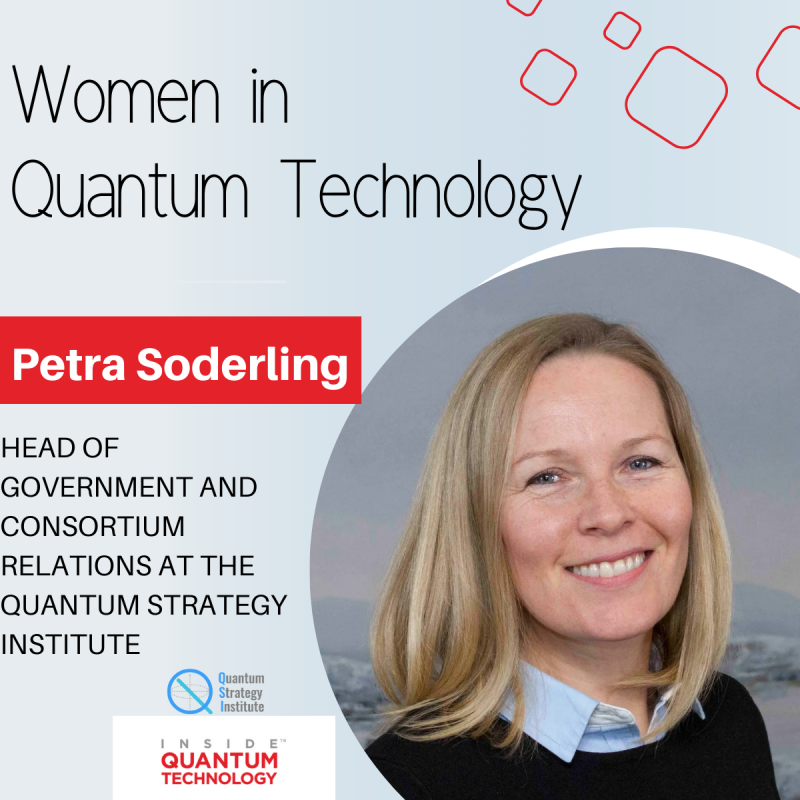Women of Quantum Technology: Petra Soderling of the Quantum Strategy Institute

The intersection of finance and quantum technology is growing important, shaping the future of global economic structures and strategies. Petra Soderling, the Head of Government and Consortium Relations at the organization, the Quantum Strategy Institute, is at the forefront of this innovative junction.
Soderling’s work is not just about advancing technology; it’s a quest to redefine how national and regional governments can drive global progress in an increasingly quantum-informed world. “I’m deeply motivated by exploring if breakthrough science could be scaled globally and how it could be used for good,” Soderling told Inside Quantum Technology. “I’m equally interested in how humanity can move towards abandoning the ways of the industrial revolution of the late 1800s, that is, taking raw materials and manufacturing things with pollution as a side effect – towards ways of maintaining a comfortable lifestyle for everyone by using nature’s tools, methods and resources found in physics and biology without the pollution.”
Soderling’s career path into the quantum industry was far from linear. “In high school, I wanted to become a philosopher or an artist, but got into technology by accident,” she elaborated. “I was lucky to work for the world’s biggest mobile phone company, Nokia when mobile phones weren’t a thing yet. I was part of pioneering teams creating this brand-new product category and inventing the essential patents that made the smartphone long before the iPhone.”
With a degree in Business Administration and several business certifications from Harvard University and Stanford University, Soderling worked at Nokia for over a decade before switching positions. “In late 2018, I was hired by the government of Finland to do Foreign Direct Investment from the USA to Finland,” Soderling said. “I had to start from scratch and think about reasons for a North American company to set up operations in a faraway Nordic country. The obvious answer is the high quality of Finnish technology. Still, I needed to narrow it down and find niches of deep tech pockets that would be interesting to the Americans. It came down to a handful of technologies: 5G/6G and other radios, Computer Vision, Imaging, Camera technologies, microelectronics, the combination of these for autonomous systems that function in cold and harsh weather.”
After working in this position for a couple of years, Soderling found her position quickly shifting towards quantum technology. Soderling elaborated: “In May 2020, Finland announced they started working on a 5 qubit superconducting computer, so naturally, I had to study what this is all about. I quickly understood this will be one of the crown jewels of Finnish deep tech know-how in the coming years.” Finland has quickly become a growing quantum hub in the Nordic countries as they recently publicly opened their quantum computer for business advantage.
To learn about this growing industry, Soderling, like many others, began to do her research. “I went all in on quantum,” Soderling stated, “the more I studied, the more I understood this is the technology I had been waiting for since I joined Nokia in 2000. It’s a natural science; it can solve many of the existing environmental problems we’ve created for ourselves, and it is open-ended for fascinating discoveries at an exceeding pace.”
Besides transitioning careers to working at the World Bank in the past couple of years, Soderling’s studies also drew her to take a position at the Quantum Strategy Institute, where she is currently the Head of Government and Consortium Relations. “As the Head of Government and Consortium Relations, I have the privilege to talk directly with civil servants and policymakers in countries already investing and enjoying results of quantum technologies, as well as with countries that are taking their first steps in quantum,” she said. “The mission of the Quantum Strategy Institute is to enhance end-user adoption, so having this conversation with the governments at this very moment is extremely important.” With many governments investigating the possible advantages of quantum computing, Soderling has become busy working with policymakers.
As if her work at the Quantum Strategy Institute didn’t keep her busy enough, Soderling runs her consulting firm. “For the past 1.5 years, I’ve been deployed by the World Bank to advise the Republic of Serbia on implementing their AI strategy to advance their science, commerce, and government operations,” stated Soderling. “Since my book Government and Innovation – the Economic Developer’s Guide to our Future came out in March 2023, I have been invited to consult a handful of governments in Asia and Europe on how to strategize deep technology, including quantum, so it benefits the economy in the best possible way.”
With her many leadership positions and interest in governance and technology, Soderling has come to understand how inclusivity can make technological industries like quantum more diverse. She highlighted that “Diversity, Equity, and Inclusion are issues that are not moving forward without constant attention and constant hard work. As unpleasant as it is, there are counterforces out there, so a relapse in attention can result in a relapse in progress. We have seen these quick relapses in the past few years. DEI must be moved forward on multiple fronts simultaneously and integrated into everything we do. It can no longer be a sideshow at tech conferences.”
When looking at the quantum industry specifically, Soderling has some specific points. “I have hope in two things; One being the shortage of talent forces recruiters to look outside the box and search for diverse hires,” She said. “The second is the need for cross-disciplinary teams representing a wide range of scientific and commercial backgrounds. There is no shortage of well-educated, capable, smart, and agile DEI hires. All it takes is to rewire the recruiter’s brain to pick those resumes from the pile.”
Kenna Hughes-Castleberry is the Managing Editor at Inside Quantum Technology and the Science Communicator at JILA (a partnership between the University of Colorado Boulder and NIST). Her writing beats include deep tech, quantum computing, and AI. Her work has been featured in Scientific American, Discover Magazine, New Scientist, Ars Technica, and more.



















